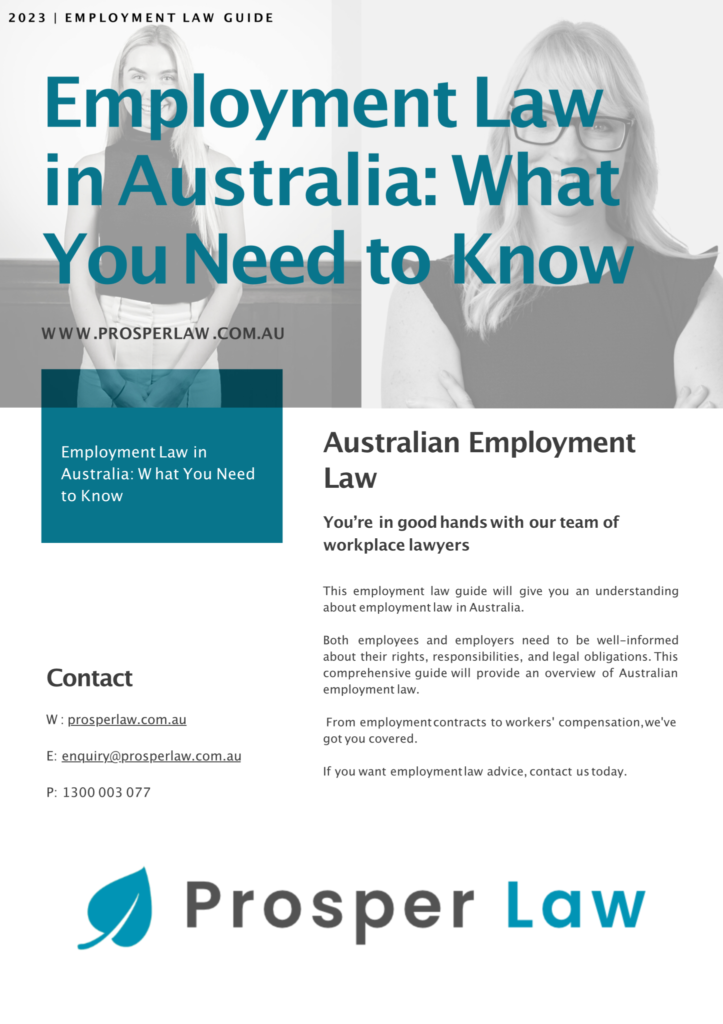Terminating an employee for taking sick leave can be risky for employers. But what if the employee has taken a significant amount of time off work or isn’t providing medical certificates? Does an employer have the right to dismiss the employee if they’re never at work?
In this article, our employer lawyer looks at the legal issues regarding sick and carer leave. In particular, we explain when dismissing an employee for taking sick leave may:
- have a low risk of leading to a successful unfair dismissal claim or general protections claim
- lead to a successful claim by an employee that they have been unfairly dismissed
- or that an employer has engaged in adverse action
Key Takeaways
Employers should seek employment legal advice before dismissing an employee because they are ill, injured or have taken sick and carer’s leave.
Workers taking sick and carer’s leave need to make sure that they provide supporting evidence as soon as they start a period of leave.
Paid sick and carer’s leave is a legal entitlement. Terminating an employee for taking paid sick and carer’s leave can lead an employer into hot water (legally speaking).
Understanding Sick Leave Entitlements
The Fair Work Act sets out the minimum national employment standards in Australia. Full-time employees are entitled to 10 days personal leave per year and part-time employees are entitled to a pro rata of 10 days per year. Casual employees do not receive paid sick leave but can take some unpaid sick leave.
Paid sick and carer’s leave is paid at the rate that applies to the employee’s ordinary hours.
Sick leave and personal leave are used interchangeably in this article. However, under the Fair Work Act personal leave can be taken due to personal illness or injury, to care for a family member or a member of the employee’s household who is ill or injured.
Dismissing an employment because the employee has taken sick leave is unlawful. It is important to protect an employee’s right to take sick leave, given the potential for employers to discourage employees from using their leave entitlements even during blackout periods.

Legal considerations regarding sick and carer's leave
What is a prescribed illness or injury?
An employer must not dismiss an employee because the employee is temporarily absent from work due to a ‘prescribed illness or injury’. The following are ‘prescribed’:
- the worker has provided a medical certificate or statutory declaration about the illness or injury within 24 hours of the start of their absence or a longer period of time that is reasonable in the circumstances; or
- the worker has complied with legal requirements (for example, under a Modern Award) to tell the employer they will be absent from work and give a reason; or
- the worker has provided the employer with other evidence that may be required by the Fair Work Act.
Does an employee legally have to provide medical certificates?
Prohibited Actions
Paid sick leave
Employees are entitled to sick leave if they are full-time employees or part-time employees. Section 97 of the Fair Work Act gives employees the right to take paid personal or carer’s leave (including paid sick leave) for several reasons.
Those reasons are that:
- the employee is not fit for work because of a personal illness or personal injury; or
- to provide care or support to an immediate family member of the employee (such as a spouse or de facto partner), or a member of the employee’s household, who requires care or support because of:
- (i) a personal illness, or personal injury, affecting the member; or
- (ii) an unexpected emergency affecting the member.
An employer cannot dismiss a full-time employee or a part-time employee for taking paid sick leave. That is, provided that the employee has also complied with the notice requirements that we explained above.
When it comes to casual employees, the situation is more complicated. However, employers looking to dismiss a casual employee may do so without significant legal risk.
However, they should not say that a casual worker’s employment was terminated for the reason that they took sick leave.
Unpaid sick leave
An employee may need to take unpaid sick leave if they have used all of their paid sick and carer’s leave. This is acceptable and may in fact be necessary if an employee has a life-threatening illness or unexpected emergency.
However, there are limits. These limits are discussed further below.
Valid reasons for termination of employment on sick leave
Long-term absence from work
An employee who is taking excessive sick leave and is frequently absent from work is a problem for employers. Frequent and long-term absences from work can:
- put pressure on other employees to do the work that the absent employee cannot
- make it difficult for employers to meet customer demands
- make decisions about their resourcing requirements
The Fair Work Regulations and prescribed illness or injury
Helpfully, the Fair Work Regulations address situations where employees are taking sick or carer’s leave for extended periods. Regulation 3.01 is the relevant section. It states that an extended period of sick and carer’s leave is when an employee takes more than 3 months’ unpaid leave in a 12-month period.
When calculating whether an employee has taken 3 months’ sick leave, employers cannot include any paid sick leave. And, it does not matter if the absence is ad hoc, provided that over a 12-month period, it totals more than 3 months.
It is important to note that just because this means that an employer is not prohibited from dismissing an employee, they are not out of the woods just yet. Dismissing an employee who takes significant periods of sick or carer’s leave may still be considered harsh, unjust or unreasonable. In those circumstances, a worker may still have a valid claim for unfair dismissal.
So if you’re an employer with an employee who has used all of their sick or carer’s leave entitlement and they are not attending work for more than 3 months, there is a potential legal avenue to dismiss the employee. Speak to our employment lawyer to learn more.
Failure by an employee to provide medical certificates
Personal illness and unable to fulfil the inherent requirements of a role
Difficulties may arise where the employee’s incapacity (or conduct) is related to the employee’s illness or injury.
Where the reason for dismissal relates to capacity, a worker can make an unfair dismissal application or general protections claim. The Fair Work Commission (FWC) will consider whether the employee was able to perform the inherent requirements of the role at the time of dismissal. The FWC will also consider if the employee could perform the role in the future.
In these circumstances, an employer should obtain medical evidence as to the employee’s likelihood of returning to work. If an employee is likely to return to work in the short or medium term, this may mean that there was not a valid reason for termination.
On the other hand, medical evidence may show that the employee is unable to perform the inherent requirements of the role.
Frequently Asked Questions
Can casual employees take sick leave?
Casual employees cannot take paid sick and carer’s leave, however they are entitled to unpaid leave.
Are sick and carer’s leave the same thing?
Is there a sick pay guarantee?
Yes, the Fair Work Act provides eligible employees with guaranteed sick and carer’s pay of 10 days per year.
Can an employee take annual leave instead of sick and carer’s leave?
Yes, an employee can choose to use some of their annual leave entitlement instead of taking unpaid or paid personal leave.




